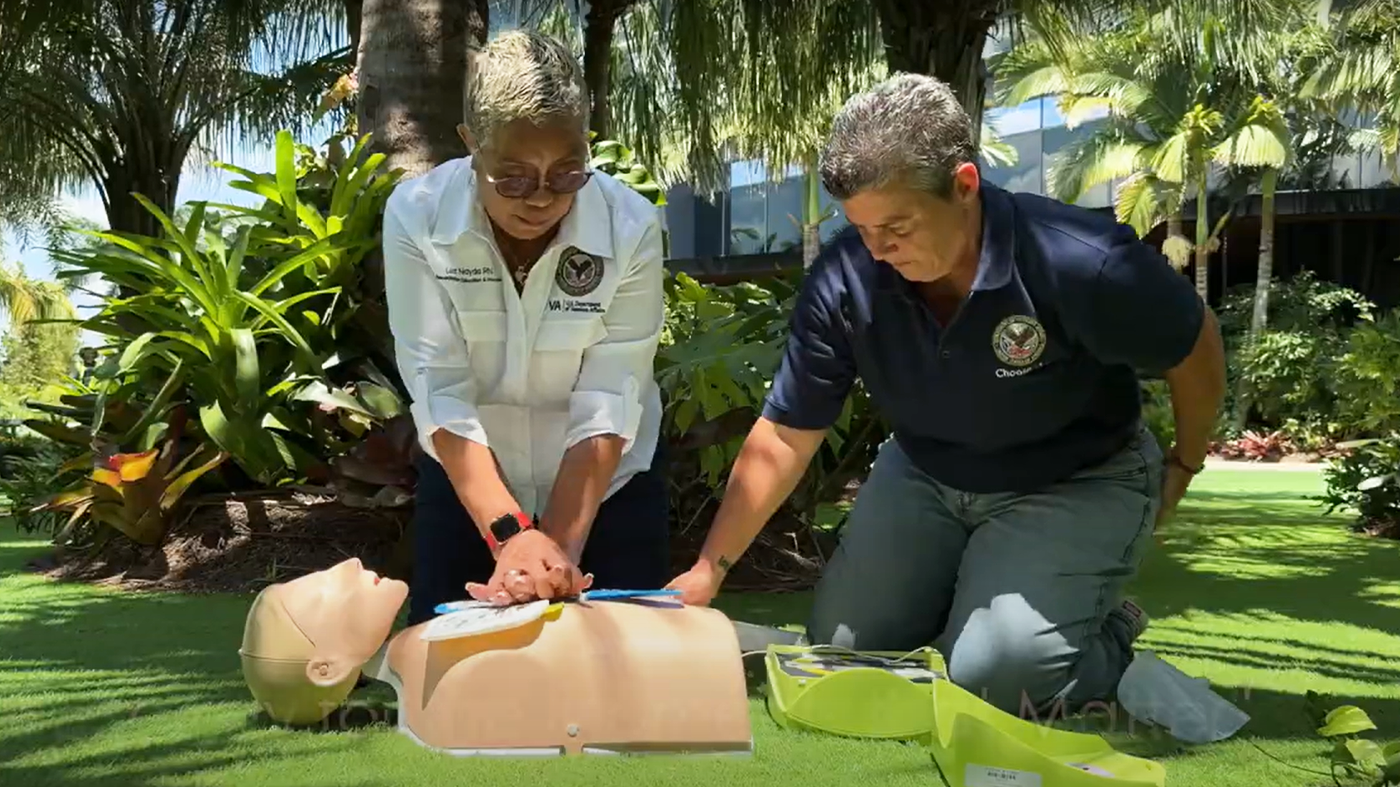Orlando VA is leading the way in innovative care for Veterans with a new tele-dentistry program that leverages virtual technology to streamline dental evaluations.
This pilot program focuses on Veterans with oral lesions and enables timely and convenient dental assessments that reduce wait times and minimizes the need for in-person appointments.
By combining dental expertise with VA’s digital technology (Connected Care) program where patients and providers share information outside of real-time appointments, this service brings a promising solution to the challenge of providing timely access to dental evaluations.
Unlike traditional in-person visits, which often require multiple appointments and significant travel for Veterans, tele-dentistry uses a “store and forward” model.
In this approach, high-quality images of a Veteran’s oral lesions or post-surgical healing can be captured at one of Orlando VA’s remote sites and sent electronically for evaluation by dental specialists.
Dr. Junaid Farooqui, chief of Dental Service, emphasized the advantage of this model. “Instead of asking Veterans to make the trip to Lake Nona for every evaluation, we can assess the images remotely and determine whether an in-person appointment or further action is needed.”
A practical solution that will aid in timely care
This method emulates a successful model pioneered in dermatology at Orlando VA, where skin lesions are photographed and assessed by offsite specialists. Modeling their success, the dental team saw a clear opportunity to adopt a similar workflow for oral health, especially for patients with limited access to dental services in remote areas.
Dr. Teri Carper, chief of Connected Care at the Orlando VAMC facility, worked closely with Farooqui to establish tele-dentistry, envisioning it as a practical solution that will aid in timely care.
“For many Veterans, traveling to the main medical center for an initial consultation can be time-consuming. Now, a Veteran who may have had to wait weeks for a consultation can have their condition assessed in a matter of days or the same day, thanks to this new program,” Carper said.
The process is simple yet highly effective. A trained telehealth technician captures detailed images of the patient’s lesion at a remote site such as Orlando VA’s outpatient clinics in Daytona, Lake Baldwin or Viera. These images are then reviewed by a dental specialist who can quickly determine if additional treatment is required. For Veterans, this means fewer trips to VA, reduced wait times and a more efficient process overall.
With plans to expand tele-dentistry to include postoperative evaluations, the program aims to make ongoing care simpler and more accessible for Veterans.
“For certain procedures such as post-surgical checks, we often have patients come back after a week or two. Now, we’re exploring the possibility of evaluating their recovery remotely, which saves them a trip and frees up appointment slots for other Veterans who need in-person care,” Farooqui said.
As the tele-dentistry program gains momentum, Farooqui anticipates that it will reduce wait times and improve overall access to dental care for Veterans. Although this initiative is in its early stages, Farooqui is optimistic about its impact and hopes it will soon be integrated as a standard part of Veteran dental services.
Topics in this story
More Stories
A VA program provides hands-on, immersive sessions where caregivers can practice CPR through realistic home-based scenarios.
You have a tool literally at your fingertips to manage stress. Check out these five simple acupressure points you can use anytime you need to relax.
VA is doing a lot to meet the needs of women Veterans—improving access, expanding services, and investing in specialized care.






Seems like another way to put more distance between a doctor and patient. Vets get to see a simple technician instead of face to face with a doctor. — Not unlike the messaging “wall” and bureaucracy where administrative and actual decisionmakers hide behind and blocks us from getting access to a human in charge.
Could help some regarding travel issues but I predict this will not be good just like how all these work from home people and bureaucratic rules for feifdoms create a hugely inefficient bureaucracies. Just yesterday a worker in the community care office at the hospital had to “message” his boss to ask for permission to print out my CC authorization to hand to me in person. Stupidity!
Tele-imaging, I predict, will cut you off from face time with the doctor and you will be stuck with only getting remote replies from the simpleton person taking the images.
This is a complete waste of time and BS! VA does not help veteran with dental care. Stop using veterans to get attention and support for your pilot dental program, especially a program that will not and can not help veterans!
Why do veterans have to be blind, crippled or crazy(100%) to receive much needed dental care.
I believe you have to be at least 100 percent disabled in order to receive dental care. When will the VA catch up to the rest of the worlds common knowledge that good dental care is essential to ones overall health and increase the number of veterans that can have access to this vital medical need.
I’ve tried having dentures made at the Long Beach VA Med. Ctr. After many trips and time spent, the dentures never fit properly, and I had to give up and return to my old dentures. If you have a better way that work, I would like to access your knowledge. Thank you. Matthew Davison, disabled Veteran.
Too much BS and of course you got the same thing with the AI
Hard to work on teeth through Teledentistry